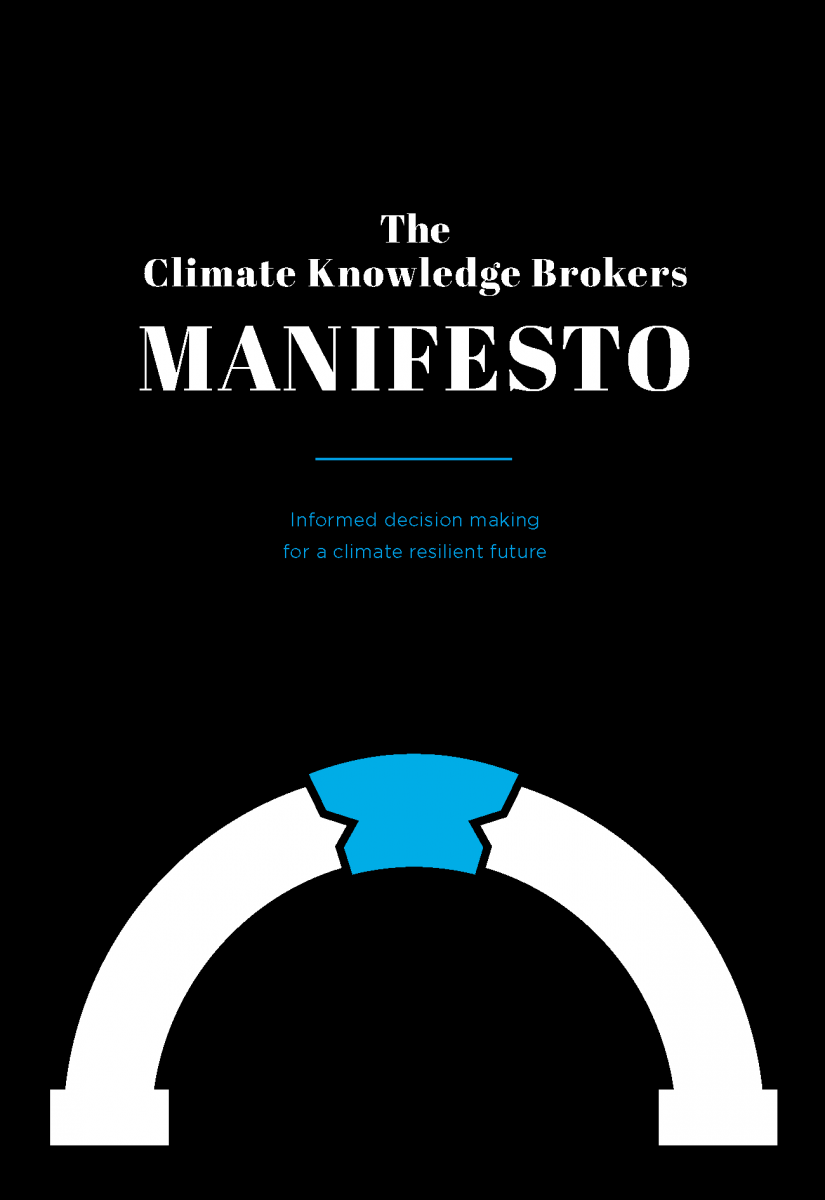We Are All Knowledge Brokers, You Know
We're all knowledge brokers. As social beings we naturally pass around information, filtering it and combining it with other bits of information that we think are relevant or interesting, then communicating that to others. In this way knowledge moves from one person to another, whether it's the latest football scores, what candidates said during an election campaign, or how a changing climate is likely to impact on the frequency of flooding in a particular place.
Some people take on this knowledge brokering role explicitly in their jobs. Not many will have the job title 'knowledge broker', but they will have an explicit role in being part of a chain moving information from knowledge producers towards knowledge users, and vice versa. Work in Monitoring and Evaluation? You're a knowledge broker, at least for part of your job. Work in learning? You're definitely a knowledge broker. Consultant? Knowledge broker.
Last week we launched the Climate Knowledge Brokers Manifesto.
 The Manifesto highlights the growing realisation that thinking about the climate can no longer be solely the domain of climate scientists, or environmental policy-makers. Most of our lives, jobs and environment are sensitive to a changing climate. Effective decision making will be needed in many areas, from a great many people, if we are to build a climate resilient future.
The Manifesto highlights the growing realisation that thinking about the climate can no longer be solely the domain of climate scientists, or environmental policy-makers. Most of our lives, jobs and environment are sensitive to a changing climate. Effective decision making will be needed in many areas, from a great many people, if we are to build a climate resilient future.
So it's a good job we are all natural knowledge brokers. At the moment, too many of those people do not have the knowledge they need. Now, more of us need to become effective and efficient climate knowledge brokers, who take on the role for information about, or relating to the climate.
You can think of a spectrum of users, with potential users who aren't yet considering climate information at all at one end, to users at the other end with access to too much information, lacking sufficient time to sort through it all to find what they need. Somewhere in between sit people who have a need for information that no-one is currently collecting, and those who don't have access to information that does exist somewhere.
How to address these different barriers? Clearly, relevant information must be available and accessible. This means adopting open data standards, constructing information systems so content can be easily shared, and creating peer networks to exchange learning on what's working and what's not, to avoid reinventing the wheel.
The multiplicity of user needs means climate knowledge brokers must tailor their products and services. A ‘one size fits all' approach doesn't work. A government policy-maker doesn't need the same information as a farmer; a city-planner doesn't have the same requirements as an individual householder. To be useful, information must be actionable, which means the user must be able to relate it to his or her own circumstances. The more the knowledge broker can synthesize climate information for a particular user and contextualise it with information from the user's own sector and/or locality, the better.
For those of you who haven't come across it yet, CKB is a community of practice for climate knowledge brokers, meeting regularly since 2011. Participants include many leading climate information players such as the Climate Technology Centre and Network, NREL's Open EI, GIZ, ClimateTechWiki, UNFCCC, Eldis, World Bank Climate Smart Planning Platform, and many more. The climate knowledge brokers engaged in the group don't just deal with information from climate science or climate data per se. Many do, but some are also acting as brokers for information on how people respond to a changing climate – mitigation or adaptation projects, or clean technology, for example. We learn together how to be more effective as climate knowledge brokers.
The Manifesto's launch was the culmination of a six month collaborative process involving 17 contributors, 80 interviewees and sixty knowledge brokers in attendance at the CKB Annual Workshop in UN City in Copenhagen, plus many others commenting on drafts and engaging in stimulating discussions.
One such discussion, on the definitions of data, information and knowledge, led to another article on the Climate-Eval blog. Coupled with the reinforced sense from the interviews that climate knowledge brokers must be demand driven rather than information-supply led, thinking about those definitions has brought a priority more clearly into focus for CKB: the emphasis on learning. Unless a person learns, information they have been given does not become part of their knowledge. To do their job well, knowledge brokers have to be concerned not just with presenting information, but also ensuring their users are able to use it for whatever purpose they have, whatever decision they are making. Therefore those users need to learn.
On Friday, the day after the official launch at the Overseas Development Institute in London, we had a round-table discussion on the overlaps between knowledge brokering, evaluation and learning. It was hosted by the UK's Department for International Development (DFID) and involved a number of the programmes they fund, including CDKN, BRACED and the new ICF Monitoring, Evaluation and Learning Programme (MEL). Some interesting points were raised:
- People learn from connection. There was a lot of discussion about social learning. For that, there is a need to create quality of attention and engagement. You can't have the assumption that expert producers simply push information out and that is sufficient. People take knowledge and adapt it, apply it in their own context. So what's the feedback loop? It's non-linear so you need to think about creating a learning system, with flows of questions, information, knowledge.
- When do we have time to pull ourselves away from the doing to do the learning? Design - implement - complete - move on is still the dominant model in development and it will take courage from some big funders if that is to change.
- We must not always put ourselves at the centre. Whether we are programme planners, managers or evaluators, we need to look at the whole system (stakeholder - projects - programme - system), and facilitate processes to ensure evaluation and learning is useful for everyone.
These reveal challenges at two interfaces that will be relevant to Climate Eval readers: feeding climate information into learning situations (whether formal or informal) effectively; and getting knowledge out of learning situations meaningfully so that it can be passed on to others. Both are difficult to do well, in an engaging manner that helps users learn.
So, plenty of challenges ahead… We in CKB think the only way to meet user needs and ensure people make climate sensitive decisions fully informed by the best available climate knowledge is through collaboration. We have committed to this as a standard in our work in the principles contained in the Manifesto. Working together is ultimately what the Manifesto, and CKB, is all about. If you agree, you can become a signatory to the Manifesto here - you'd better read it first though!



